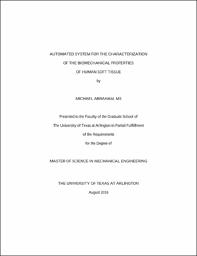
ATTENTION: The works hosted here are being migrated to a new repository that will consolidate resources, improve discoverability, and better show UTA's research impact on the global community. We will update authors as the migration progresses. Please see MavMatrix for more information.
Show simple item record
| dc.contributor.advisor | Shiakolas, Panayiotis S. | |
| dc.creator | Abraham, Michael R. | |
| dc.date.accessioned | 2019-07-17T19:04:36Z | |
| dc.date.available | 2019-07-17T19:04:36Z | |
| dc.date.created | 2016-12 | |
| dc.date.issued | 2016-12-20 | |
| dc.date.submitted | December 2016 | |
| dc.identifier.uri | http://hdl.handle.net/10106/28379 | |
| dc.description.abstract | Vaginal prolapse is a common condition that affects a large number (approximately 3.3 million in the US) of women, mainly above the age of 50 years. The condition is characterized by the weakening and breakdown of the pelvic support structures such as muscles and connective tissues, leading to the dislodging and prolapse of pelvic organs. Current examinations of the pelvic tissue are manually performed by the physician who assesses its rigidity. These exams are subjective and offer qualitative rather than quantitative results of the state of the pelvic tissue. In this research, a complete system was conceptualized and designed to assess the biomechanical properties of the anterior vaginal wall in-vivo. The design mimics the palpating action performed by the physician on the vaginal wall to sense its rigidity. The reaction force profile resulting from the palpation is recorded and curve-fit to characterize the viscoelastic properties of the vaginal tissue. The data can later be used to provide a quantitative measure for the onset and progression of a condition by tracking the viscoelastic properties of the tissue.
Considerations were taken into account to accommodate the environment constraints. Different sensing, actuation, and control technologies were explored and revised to improve the design. Finite element analysis (FEA) was performed to verify the structural safety of the hardware components. The system is controlled using National Instruments (NI) LabVIEW software and a NI myRIO controller. Additionally, a graphical user interface (GUI) in LabVIEW was developed and integrated to ease the operation of the device by a physician for in-vivo testing. The system was used to collect an initial sample set of in-vivo data from patients to verify the operational function of the prototyped system and identify areas in need of improvement. | |
| dc.format.mimetype | application/pdf | |
| dc.subject | In-vivo medical diagnosis | |
| dc.subject | Diagnostic system | |
| dc.subject | Soft tissue characterization | |
| dc.title | Automated System for the Characterization of the Biomechanical Properties of Human Soft Tissue | |
| dc.type | Thesis | |
| dc.degree.department | Mechanical and Aerospace Engineering | |
| dc.degree.name | Master of Science in Mechanical Engineering | |
| dc.date.updated | 2019-07-17T19:04:37Z | |
| thesis.degree.department | Mechanical and Aerospace Engineering | |
| thesis.degree.grantor | The University of Texas at Arlington | |
| thesis.degree.level | Masters | |
| thesis.degree.name | Master of Science in Mechanical Engineering | |
| dc.type.material | text | |
Files in this item
- Name:
- ABRAHAM-THESIS-2016.pdf
- Size:
- 4.207Mb
- Format:
- PDF
This item appears in the following Collection(s)
Show simple item record


